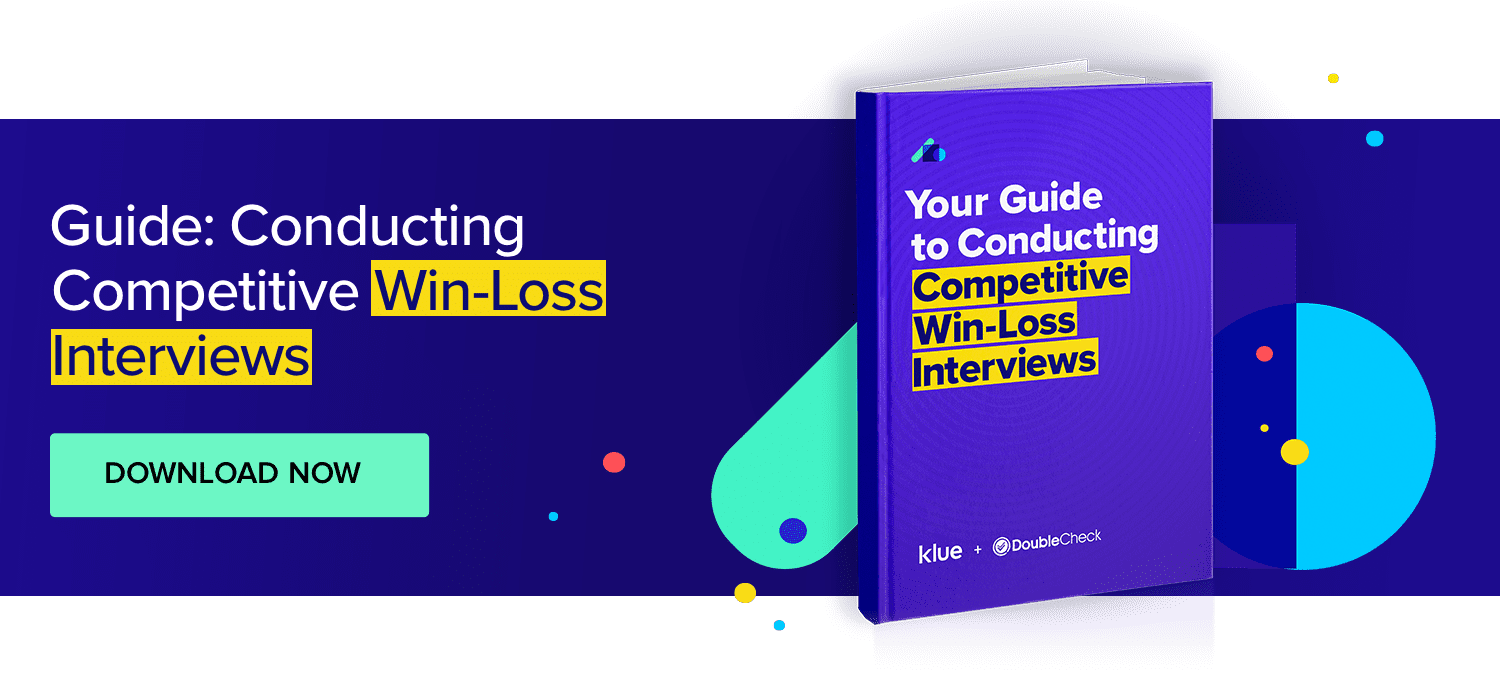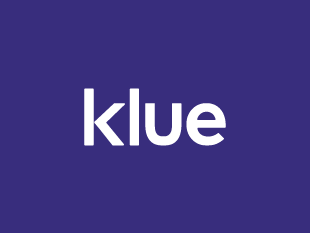Klue Compete
The Competitive Enablement Platform
Learn More
INTRODUCING KLUE INSIGHTS
FIND OUT MORE >

Many companies struggle with blind spots in their data about buyer perceptions. The good news is that well-done win-loss research is a valuable source of truth when it comes to what buyers really think about how you measure up against the competition in the marketplace. Win-loss interviews offer an unparalleled opportunity to get honest, straightforward feedback from people who have been immersed in studying up on the similarities between you and your competitors.
The key to getting the most from your efforts is knowing how to build a strong win-loss practice within your organization—from planning and preparation to execution to ultimately putting the data and insights to work to help you make smarter decisions and win more deals.


And the truth is that there’s more that goes into a well-designed and well-run win-loss practice than most people assume. For instance, nothing against salespeople, but they don’t typically dig deep into competitive intelligence questions. It’s not really their role.
I was recently invited to be a special guest on Klue’s podcast, The Competitive Enablement Show, with host Adam McQueen. As a bonus, the show was their first-ever live ask-me-anything show. Adam and I—along with more than one hundred attendees—tackled the topic of how to nail competitive win-loss interviews. We looked at the things you can’t afford to get wrong, how to set yourself up for success, the right mindset for an effective interview, and more.
Here’s the first truth to understand: Like many things in life, you will only get out of your win-loss program what you put into it. To reap the greatest rewards, you need to be intentional and committed about how you build and support your program.
It’s important to acknowledge that running a win-loss program is not a part-time job. So if, for instance, you assign program leadership to a product marketer with twenty other responsibilities on their plate, it’s unlikely that your program will have any chance to gain traction. It takes time and effort and focus to run a successful win-loss program. Ideally, you want a fully dedicated resource. At a minimum, you want someone with enough bandwidth to make the program a day-to-day priority.
You have to be consistent in your efforts. It’s like working out. Hopping on the treadmill once a month isn’t going to deliver the results you’d like. Neither will sporadic attempts at conducting win-loss interviews. Also like working out, you may not see direct results from every single interview or report, but the cumulative effect of ongoing efforts is undeniable. Over time, you’ll uncover many interesting nuggets, and some of them will be game-changing. We’ve seen plenty of instances where a loss interview with a buyer who didn’t end up choosing any provider turns into a win when the salesperson uses the interview insights to get the deal back on track.
You will conduct plenty of interviews in which you don’t learn anything new. Often, you’ll hear more of what you already know. You will have your assumptions validated. That’s to be expected. The key is to keep going (see “Consistency”) so you are always in a position to capture insights when they present themselves.
A lack of organizational buy-in is one of the biggest reasons win-loss programs fail. It’s imperative to get everyone on board. If your program starts at the top (with the board, for example), buy-in will trickle down organically. However, if the program starts with someone on the product marketing or competitive intelligence side, that person needs to sit down with the heads of marketing, product, sales, and customer success. They need to dig into what kind of information those parts of the organization needs—where their blind spots are.
The more you can get cross-functional buy-in, the sticker the program will be. Collaborating with different groups creates a partnership, which in turn creates more visibility for the program and increases the amount of value you can deliver.
It’s especially important to get sales onboard. Salespeople may initially worry that the program will become a witch hunt. It’s helpful to address those concerns in the beginning by letting people know that the sales piece is just one component of win-loss interviews and research. The ultimate aim of the program is to help sales by providing valuable enablement insights.
Another common problem that has sunk a lot of win-loss programs is collecting data and then letting it sit on a shelf. This happens when no one has done the work to figure out what to do with the data—who will be involved and what the action plan will be to turn the insights into action items. Without operationalization, people won’t learn as much as they had hoped. And without any a-ha moments, support for the program will wane.
You have to know what to do with the data once you have it. How will you structure summaries so that they are effective? How can you analyze data across multiple interviews to identify trends? In short, how do you make the work you’re doing accessible to the rest of your organization?
Structuring unstructured interview data can be really challenging, which is why we recommend a tool called Dovetail. Dovetail allows you to put all your win-loss interview data into a comprehensive and centralized research repository that makes it easy for product managers, designers, CEOs, and other stakeholders to quickly access exactly the information they want. Dovetail allows you to create manual text tags that show you what’s trending within the data set in real-time. It’s an incredibly valuable tool.
Once you have the right foundations in place, you can start looking at best practices for running efficient and effective interviews.
In our podcast conversation, Adam and I hit on three specific elements of interview prep:
At DoubleCheck Research, we recommend providing incentives for participation in win-loss interviews. We believe that if a person is giving us their time, we should give them something in return. There are two main types of incentives you can offer. The first is a straightforward and widely appreciated reward like an Amazon gift card. The second, usually appropriate for C-level folks, is a more personalized incentive that focuses on something that’s important to them. If you’re reaching out to the CEO of a Fortune 500 company, a $100 Amazon gift card isn’t likely to impress. But making a donation to a personal cause or group that they are involved in can help you create an opening for further conversation.
Before you talk with anyone, you want to do all your due diligence. You want to get a sense of who the person is, their role in the company, their general background, and so forth. LinkedIn is a great place to start, as is the company website, but don’t stop there. Checking out social profiles of both the company and the interviewee can surface additional information and insights that can help you shape the conversation. You also want to get as much information as you can from internal sources about the deal—the context of the inquiry, the products involved, how the conversation was going, and so forth.
A pre-interview survey is a great way to collect some initial data that can help you prepare for the interview. This is an opportunity to get some of the most basic questions out of the way before you get into the actual conversation. Most interviewees are happy to fill this out when it’s presented as a tool that helps optimize the interview process so that their valuable time is not wasted.
While win-loss interviews’ process, preparation, and behind-the-scenes data analysis are all critically important to a win-loss program, the heart of the whole effort lives in the actual conversation. Getting into the right frame of mind and finding your “groove” can make or break the whole thing.
For starters, don’t read off a script like a robot. Remember that this is a human-to-human interaction. Make sure to be conversational and authentic. Be interested. Be truly curious. Practice active listening. And be grateful. Let the person you’re talking to know that you’re happy to have them on the phone and excited to hear their feedback.
Try to find a connection right off the bat in your win-loss interviews. You want the person you’re interviewing to feel like your conversation is a safe haven, a place where they can offer feedback freely and honestly. Avoid things like handling objections. No one will agree to an interview if they think you’re going to try to resell them. To avoid going down the wrong path, we follow a practice called the Five Whys with the Five Hows, which helps you go deeper when you hit a point of interest. Instead of moving on to the next question, ask Why and How questions to learn more. You don’t just want surface responses. You want to get into the details so you can identify the root causes of various outcomes.
Finally, come into the conversation with a lot of confidence. Be an active participant in the dialogue. If you hesitate to ask your questions, they will hesitate to provide answers. So be courageous, and don’t be afraid to ask the hard questions in a powerful, confident manner.
Knowing which questions to ask (and in what order) is another important skill to hone. Here are a few tips to get you started in the right direction:
Finally, remember that win interviews are an excellent source of competitive intelligence. Loss interviews can also be helpful, but when you’re talking with someone who has just partnered with you, and who has recently looked super closely at your closest competitors, you can get a lot of great information about why they chose you and not the other folks.
At the end of the day, figuring out how to identify and distribute the insights from your interviews is where the rubber meets the road. We’ve found that to make sure the win-loss research data is put to good use you want to use a tool like Dovetail. Our process is to record and transcribe the interview and then summarize the findings. Those findings then go into Dovetail and are distributed to the different functional teams. From there, individuals and teams can talk about the interviews, share them broadly, watch recordings, and so forth. We also use Dovetail to create executive summary presentations and highly focused mini-research pieces. There are so many helpful use cases.
One of Dovetail’s most powerful features is the capability to search by keyword across the entire Dovetail workspace. This allows anyone to find exactly the information they want, exactly when they need it, without having to go through anyone else. Dovetail basically provides an on-demand research library that’s continually updated. This empowers stakeholders to find answers to their most pressing questions whenever they need them, without having to wait for a pre-established meeting to access the research. Dovetail is driving a revolutionary shift into a new era of pull-versus-push research.
The organizations that put in the time and effort to be thoughtful and thorough about how they structure and run their win-loss programs are the ones that will reap the most valuable benefits. An effective program will uncover helpful insights, patterns, and trends that help you stay several steps ahead of your competitors.
To hear more about what goes into a successful win-loss program, check out the entire conversation from the Klue podcast episode. You might also like the episode of our own Blindspots Podcast that features Paul Senatori and Carlo Cadet talking about how they use win-loss interviews to fuel their competitive intelligence.




Competitive Enablement
The topic of Large Language Models (LLMs) has a lot of confusion. Here's what you need to know about how Klue is working with them.


Competitive Enablement
Product Marketing
If your competitive intel game is too strong for automation, too pure for data privacy, and too rebellious for accuracy — then Klue AI is probably not for you.


Let’s do it. Tell us a bit about yourself and we’ll set up a time to wow you.
Let's do it. Tell us a bit about yourself and we'll set up a time to wow you.
XLet's do it. Tell us a bit about yourself and we'll set up a time to wow you.
XSubscribe to get our latest AI functionality and news in your inbox.
XOur Buyer Pulse feature, set to launch in Q2 2024, offers valuable insights into the factors influencing buyer decisions in your pipeline. By signing up for the waitlist, we can better gauge interest and proactively engage with you to streamline the setup and integration process before the feature becomes widely available.
X